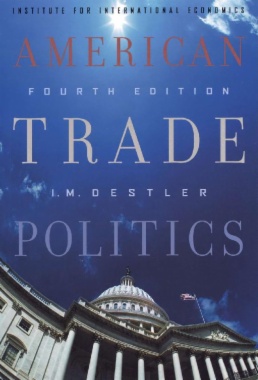In this comprehensive revision of the most influential, widely read analysis of the US trade policymaking system, Destler addresses how globalization has reshaped trade politics, weakening traditional protectionism but intensifying concern about trade's societal impacts. Entirely new chapters treat the deepening of partisan divisions and the rise of "trade and..." issues (especially labor and the environment). The author concludes with a comprehensive economic and political strategy to cope with globalization and maximize its benefits.
The original edition of American Trade Politics won the Gladys Kammerer Award of the American Political Science Association for the best book on US national policy.
- Cover
- Contents
- Preface
- Author's Note
- I Origin: 1934-70
- Chapter 1 The Root Problem: Political Imbalance
- Chapter 2 The 1934 System: Protection for Congress
- Protecting Congress from Trade Pressures
- The System's Advantages and Limits
- The System's Contradictions
- II Erosion and Adaptation: 1971-94
- Chapter 3 A Tougher World: Changes in the Context of Trade Policy
- 15 August as Prologue
- The Trade Explosioin
- The "Decline" of the United States
- The Rise of New Competitors
- The Erosion of the GATT
- Stagflation
- Floating Exchange Rates and Dollar "Misalignment"
- Economic Triopolarity and the End of the Cold War
- A Tougher World
- Chapter 4 A Less Protected Congress
- Congressional Reform and the Weakening of Ways and Means
- Renewing the Delegation of Power: The "Fast-Track" Procedures
- Industry-Specific Proposals: The Automobile Case
- Committee Competition and Policy Entrepreneurship
- The Trade and Tariff Act of 1984: Pressure Contained
- 1985-88: The Years of Trade
- The Omnibus Trade and Competitiveness Act of 1988
- NAFTA and Fast-Track Renewal
- 1984 and After: The Leadership Difference
- Chapter 5 An Embattled Executive
- STR's Early Ups and Downs
- Strauss and the MTN: The STR on Center Stage
- The Executive Broker and Its Critics
- The Carter Reorganization
- Reagan I: Commerce Versus USTR
- USTR and Presidential Ambivalence
- Liberal Words, Protectionist Deeds
- Reagan II: An Eight-Month Vacuum
- Reagan II: The Shift to Activism
- Targeting the World: Section 301
- Targeting Japan: From MOSS to Semiconductor Sanctions
- Working the Trade Bill: Damage Limitation
- Carla Hills and Super 301
- Geneva Versus Mexico City?
- NAFTA but Not (Yet) GATT
- Chapter 6 Changing the Rules: The Rise of Administrative Trade Remedies
- Through the Early 1970s: Little Relief
- The Trade Act of 1974
- The Result: Slightly More Relief
- The Trade Agreements Act of 1979
- The Declining Use of the Escape Clause
- The Decline of Trade Adjustment Assistance
- The Upsurge in "Unfair Trade" Cases
- Forcing Political Solutions
- Steel Wins Comprehensive Protection
- New Legislative Initiatives
- The Uruguay Round Antidumping Agreement
- Administrative Remedies: A Balance Sheet on 1980-94
- The Limits of Administrative Remedies
- Chapter 7 The National Arena: New Dimensions of Conflict
- An "Amazing Political Reversal"?
- A Newly Ambivalent Elite
- Challenges to Laissez-Faire Trade Doctrine
- New Patterns of Interest Group Politics
- Conclusions
- Chapter 8 Triumph! NAFTA and the WTO
- Back from the Precipice
- From Candidate to President
- The NAFTA Debate: Critics Rush to Fill the Vacuum
- Clinton Recovers, and Wins Big
- Japan, China, and APEC
- Brussels and Geneva: Completing the Uruguay Round
- US Business, Human Rights, and the China Market
- Japan: Failure and Modest Success
- Implementing the Uruguay Round: A Slow Start
- Antidumping: Reversing the Round
- The Loss of Future Fast Track
- The WTO and US "Sovereignty"
- Delaying the Process: Dole, Hollings, and Gingrich
- From Partisan Wrangle to Bipartisan Victory
- End of an Era?
- III Polarization: 1995-
- Chapter 9 The Decline of Traditional Protectionism
- Economic Resurgence
- Clinton and Barshefsky: Business (Mostly) As Usual
- Trade Remedies, Especially Antidumping
- The World Trade Organization
- Reemergence of the Trade Deficit--and Its Lesser Political Impact
- The Globalization of US Business
- Two Questions
- Chapter 10 New Issues, New Stalemate
- Threat to the Social Contract?
- Impact of NAFTA
- Clinton's Fast-Track Fiasco
- Dilemmas of Substance and Process
- The Battles of Seattle
- Normalizing China
- Chapter 11 Partisan Rancor and Trade Politics in the New Century
- Polarization of Congressional Politics
- Decline of House Bipartisanship on Trade
- The House Bill in 2001: Partisan Contention
- Bipartisan Compromise in the Senate
- Zoellick and "Competitive Liberalization"
- Cancun--and Geneva
- Into the Second Bush Administration
- Implications
- IV Conclusion
- Chapter 12 Conclusion: Making America Fit for Globalization
- Bringing the Benefits of Imports Out of the Closet
- Lukewarm Public Support for Trade Expansion
- Uneven Distribution of Gains from Trade Expansion
- Two Key Preconditions: Macroeconomic Balance and Productivity Improvement
- Completing the Transition to Globalization
- Completing the Transition to Globalization at Home
- Appendix A Trade Promotion Authority in 2001: The Bargain That Wasn't
- Glossary
- Index

